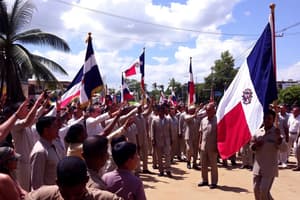Podcast
Questions and Answers
What is the number of leaders in a dictatorship?
What is the number of leaders in a dictatorship?
- There are no leaders
- There is one leader (correct)
- The number of leaders varies
- There are multiple leaders
What are the rights and freedoms like in a dictatorship?
What are the rights and freedoms like in a dictatorship?
People generally have no rights and freedoms or very few rights and freedoms.
How does the government control the media in a dictatorship?
How does the government control the media in a dictatorship?
The government controls what the media can and cannot say.
In a dictatorship, the government reacts violently towards any protest.
In a dictatorship, the government reacts violently towards any protest.
Who has the power in a dictatorship?
Who has the power in a dictatorship?
Dictators are elected in fair elections.
Dictators are elected in fair elections.
How do dictators typically get their position?
How do dictators typically get their position?
When do dictators lose their position?
When do dictators lose their position?
What is the government structure of a dictatorship?
What is the government structure of a dictatorship?
What are common characteristics of a dictator?
What are common characteristics of a dictator?
Flashcards
Leadership in a Dictatorship
Leadership in a Dictatorship
A dictatorship is ruled by a single individual.
Rights and Freedoms in a Dictatorship
Rights and Freedoms in a Dictatorship
Citizens have very few or no rights/freedoms, as the government controls most aspects of life.
Media Control in a Dictatorship
Media Control in a Dictatorship
The government controls what the media can and cannot say, often using it for propaganda.
Response to Protests in a Dictatorship
Response to Protests in a Dictatorship
Signup and view all the flashcards
Power in a Dictatorship
Power in a Dictatorship
Signup and view all the flashcards
How Dictators Gain Power
How Dictators Gain Power
Signup and view all the flashcards
How Dictators Lose Power
How Dictators Lose Power
Signup and view all the flashcards
Government Structure in a Dictatorship
Government Structure in a Dictatorship
Signup and view all the flashcards
Characteristics of a Dictator
Characteristics of a Dictator
Signup and view all the flashcards
Study Notes
Characteristics of a Dictatorship
- Dictatorships are led by a single leader who holds absolute power over the state.
- Citizens generally experience minimal to no rights and freedoms under a dictatorship.
- The government exercises complete control over the media, determining what information is shared with the public.
- Any form of protest is met with violent repression from the authorities.
- Power resides solely with the dictator, who makes all decisions without input from the populace.
- Elections in dictatorships are often non-existent or heavily manipulated to favor the ruling party.
- Dictators can attain their roles through hereditary succession, as seen with the Shah of Iran, or through violent means such as military coups.
- A dictator typically retains their position until death or through being forcibly overthrown.
- The governmental framework may include a parliament or judiciary, but ultimate decision-making rests with the dictator, especially in military rule contexts.
- Key traits of dictators include the brutal suppression of dissent, reliance on police and military forces for control, operating above the law, media manipulation, and significant restrictions on individual liberties.
Studying That Suits You
Use AI to generate personalized quizzes and flashcards to suit your learning preferences.




